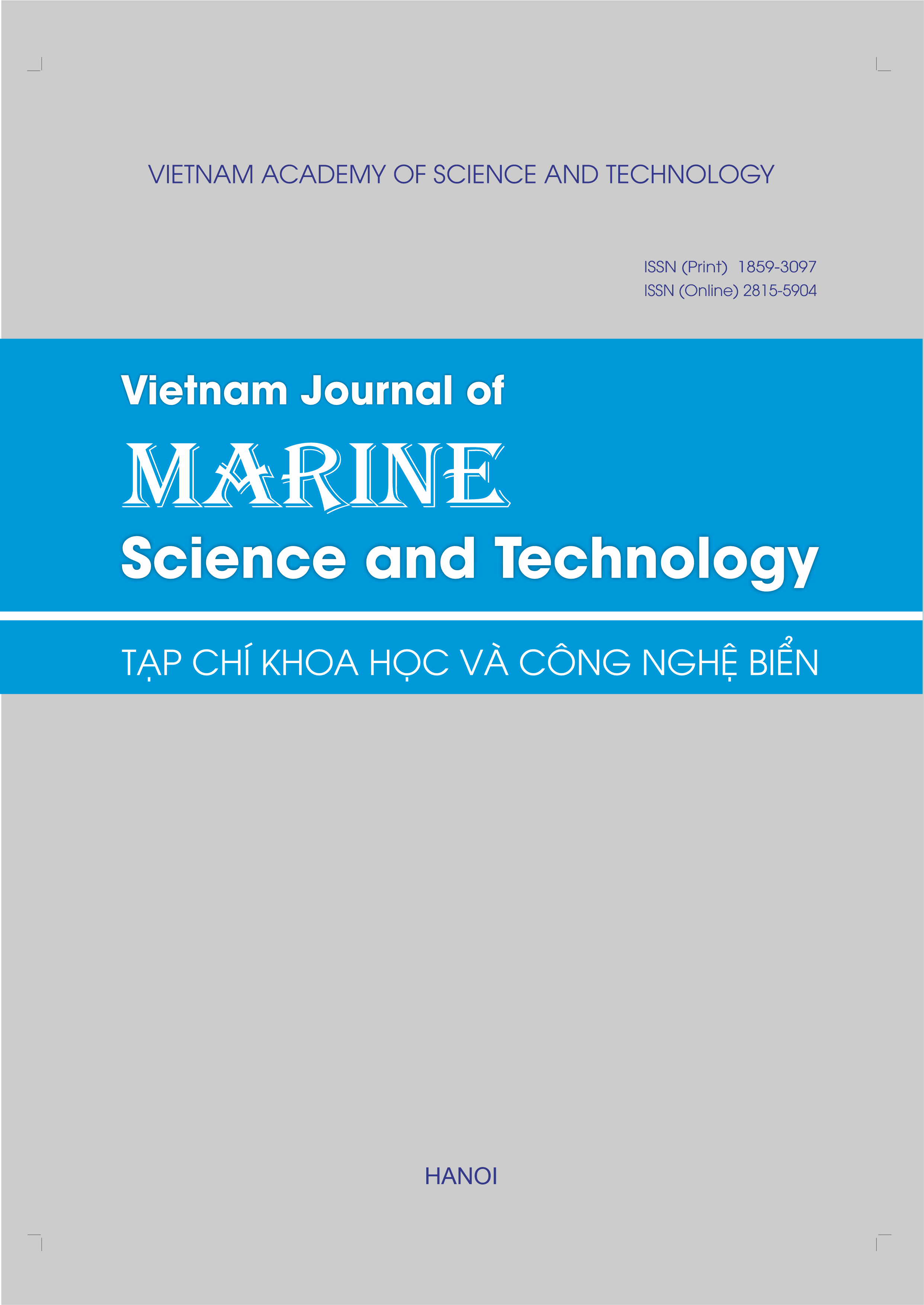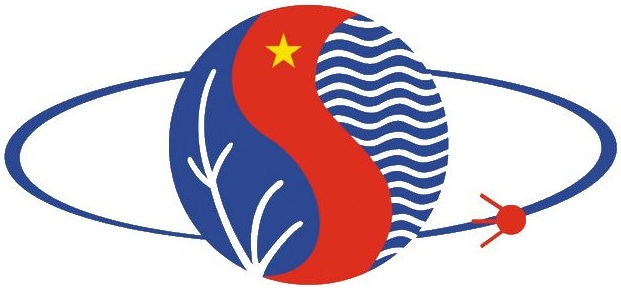Diversity of seaweed-derived marine bacteria producing sulfated polysaccharide-degrading enzymes: Isolation, Screening, and Identification
Author affiliations
DOI:
https://doi.org/10.15625/1859-3097/22729Keywords:
Fucoidan, ulvan, sulfated polysaccharide-degrading enzymes, marine bacteriaAbstract
Marine bacteria associated with algae represent a valuable source of enzymes capable of degrading complex polysaccharides, such as fucoidan and ulvan. This study investigated bacteria isolated from 12 species of brown algae and 8 species of green algae, yielding 126 and 65 strains, respectively. Selective media supplemented with fucoidan or ulvan as the sole carbon source was employed to screen for enzymatic activity. The bacterial strains were characterized based on morphological features, and molecular identification was conducted through 16S rRNA sequencing. Several isolates demonstrated significant activity on fucoidan from Sargassum mcclurei and ulvan from Ulva fasciata. Phylogenetic analysis revealed a wide taxonomic range, with strains classified into the genera Alteromonas, Bacillus, Vibrio, Cobetia, and Delftia. This diversity underscores the metabolic adaptability of marine bacteria in degrading sulfated polysaccharides. The results provide insights into the enzymatic potential of marine bacteria for biotechnological applications, particularly in the conversion of algal biomass into bioactive compounds. These findings lay the foundation for further studies on enzyme characterization and industrial utilization of marine-derived polysaccharide-degrading bacteria.
Downloads
References
[1] A. Zayed, H. T. T. Cao, V. T. D. Trang, and R. Ulber, “Structural tailoring of fucoidan backbones for maximizing their benefits: Enzymatic, chemical, and physical strategies,” Journal of Applied Phycology, vol. 35, no. 5, pp. 2445–2462, 2023. DOI: 10.1007/s10811-023-03036-6.
[2] V. H. N. Tran, M. D. Mikkelsen, H. B. Truong, H. N. M. Vo, T. D. Pham, H. T. T. Cao, T. T. Nguyen, A. S. Meyer, T. T. T. Thanh, and T. T. T. Van, “Structural characterization and cytotoxic activity evaluation of ulvan polysaccharides extracted from the green algae Ulva papenfussii,” Marine Drugs, vol. 21, no. 11, 556, 2023. DOI: 10.3390/md21110556.
[3] O. O. Zaitseva, M. I. Sergushkina, A. N. Khudyakov, T. V. Polezhaeva, and O. N. Solomina, “Seaweed sulfated polysaccharides and their medicinal properties,” Algal Research, vol. 68, 102885, 2022. DOI: 10.1016/j.algal.2022. 102885.
[4] M. S. Pereira, B. Mulloy, and P. A. Mourao, “Structure and anticoagulant activity of sulfated fucans: comparison between the regular, repetitive, and linear fucans from echinoderms with the more heterogeneous and branched polymers from brown algae,” Journal of Biological Chemistry, vol. 274, no. 12, pp. 7656–7667, 1999. DOI: 10.1074/jbc.274. 12.7656.
[5] L. S. Costa, G. P. Fidelis, S. L. Cordeiro, R. M. Oliveira, D. A. Sabry, R. B. G. Câmara, L. T. D. B. Nobre, M. S. S. P. Costa, J. Almeida-Lima, E. H. C. Farias, E. L. Leite, and H. A. O. Rocha, “Biological activities of sulfated polysaccharides from tropical seaweeds,” Biomedicine & Pharmacotherapy, vol. 64, no. 1, pp. 21–28, 2010. DOI: 10.1016/ j.biopha.2009.03.005.
[6] W. A. J. P. Wijesinghe and Y. J. Jeon, “Biological activities and potential industrial applications of fucose rich sulfated polysaccharides and fucoidans isolated from brown seaweeds: A review,” Carbohydrate Polymers, vol. 88, no. 1, pp. 13–20, 2012. DOI: 10.1016/j.carbpol.2011.12.029.
[7] L. Cunha and A. Grenha, “Sulfated seaweed polysaccharides as multifunctional materials in drug delivery applications,” Marine Drugs, vol. 14, no. 3, 42, 2016. DOI: 10.3390/md14030042.
[8] M. I. Kusaykin, A. S. Silchenko, A. M. Zakharenko, and T. N. Zvyagintseva, “Fucoidanases,” Glycobiology, vol. 26, no. 1, pp. 3–12, 2016. DOI: 10.1093/glycob/ cwv072.
[9] Q. Li, F. Hu, B. Zhu, F. Ni, and Z. Yao, “Insights into ulvan lyase: review of source, biochemical characteristics, structure and catalytic mechanism,” Critical Reviews in Biotechnology, vol. 40, no. 3, pp. 432–441, 2020. DOI: 10.1080/07388551.2020.1723486.
[10] V. T. D. Trang, M. D. Mikkelsen, M. Vuillemin, S. Meier, H. T. T. Cao, J. Muschiol, V. Perna, T. T. Nguyen, V. H. N. Tran, J. Holck, T. T. T. Van, H. H. N. Khanh, and A. S. Meyer, “The endo-α(1,4) specific fucoidanase Fhf2 from Formosa haliotis releases highly sulfated fucoidan oligosaccharides,” Frontiers in Plant Science, vol. 13, 823668, 2022. DOI: 10.3389/fpls.2022.823668.
[11] V. H. N. Tran, T. T. Nguyen, S. Meier, J. Holck, H. T. T. Cao, T. T. T. Van, A. S. Meyer, and M. D. Mikkelsen, “The endo-α(1,3)-fucoidanase Mef2 releases uniquely branched oligosaccharides from Saccharina latissima fucoidans,” Marine Drugs, vol. 20, no. 5, 305, 2022. DOI: 10.3390/md20050305.
[12] A. Trincone, Marine Enzymes for Biocatalysis: Sources, Biocatalytic Characteristics and Bioprocesses of Marine Enzymes. Amsterdam, The Netherlands: Elsevier, 2013.
[13] N. T. Thuan, T. N. H. Vy, V. T. D. Trang, C. T. T. Hang, V. M. N. Hieu, N. N. Linh, N. D. Thuat, and T. T. T. Van, “Potential produce alginate lyase by bacteria strains isolated from coastal regions in Vietnam,” Tap chi Sinh hoc, vol. 41, no. 2se1&2se2, pp. 273–279, 2019. [in Vietnamese].
[14] V. T. D. Trang, C. T. T. Hang, P. T. H. Trinh, N. T. D. Ngoc, H. H. N. Khanh, and T. T. T. Van, “Isolation of marine bacteria from sponges in the south-central coastal region of Vietnam with brown seaweed polysaccharide-degrading activities,” Vietnam Journal of Science and Technology, vol. 58, no. 6A, pp. 41–51, 2020.
[15] T. T. Vo, N. H. Le, and T. H. Nguyen, “Potentiality of Vietnam green seaweed for bioethanol production,” Old Journal, no. 134A, pp. 52–58, 2019.
[16] T. Van Nguyen, N. H. Le, S. M. Lin, F. Steen, and O. De Clerck, “Checklist of the marine macroalgae of Vietnam,” Botanica Marina, vol. 56, no. 3, pp. 207–227, 2013. DOI: 10.1515/bot-2013-0010.
[17] T. N. H. Vy, N. T. Thuan, C. T. T. Hang, V. T. D. Trang, V. M. N. Hieu, M. L. Bui, and T. T. T. Van, “Biodiversity of cultivable marine bacteria isolated from Nha Trang Bay, Vietnam,” Tap chi Sinh hoc, vol. 41, no. 2se1&2se2, pp. 109–115, 2019. [in Vietnamese].
[18] P. Duc Thinh, R. V. Menshova, S. P. Ermakova, S. D. Anastyuk, B. M. Ly, and T. N. Zvyagintseva, “Structural characteristics and anticancer activity of fucoidan from the brown alga Sargassum mcclurei,” Marine Drugs, vol. 11, no. 5, pp. 1456–1476, 2013. DOI: 10.3390/md11051456.
[19] C. T. T. Hang, V. M. N. Hieu, P. T. H. Trinh, T. T. T. Thuy, Q. T. M. Thu, T. N. H. Vy, N. T. Thuan, and T. T. T. Van, “Structural characteristics and antioxidant activities of polysaccharide extracted from Ulva fasciata green seaweed,” VNU Journal of Science: Natural Sciences and Technology, vol. 39, no. 1, pp. 32–39, 2023. DOI: 10.25073/2588-1140/vnunst.5360.
[20] N. T. Thuan, C. T. T. Hang, H. H. N. Khanh, T. H. Bang, P. D. Thinh, T. T. T. Van, and B. M. Ly, “Study of using the fucoidan-containing solid media plates for screening and identifying fucoidanase from marine microorganisms,” Academia Journal of Biology, vol. 38, no. 2, pp. 186–191, 2016. DOI: 10.15625/0866-7160/v38n2.7112.
[21] S. Kumar, G. Stecher, and K. Tamura, “MEGA7: molecular evolutionary genetics analysis version 7.0 for bigger datasets,” Molecular Biology and Evolution, vol. 33, no. 7, pp. 1870–1874, 2016. DOI: 10.1093/molbev/ msw054.
[22] J. Xie, Y. Chen, G. Cai, R. Cai, Z. Hu, and H. Wang, “Tree Visualization By One Table (tvBOT): a web application for visualizing, modifying and annotating phylogenetic trees,” Nucleic Acids Research, vol. 51, no. W1, pp. W587–W592, 2023. DOI: 10.1093/nar/gkad359.
Downloads
Published
How to Cite
Issue
Section
License
Copyright (c) 2025 Vietnam Academy of Science and Technology

This work is licensed under a Creative Commons Attribution-NonCommercial-NoDerivatives 4.0 International License.








